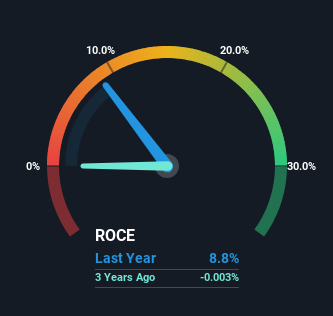Returns On Capital Are Showing Encouraging Signs At Dhampur Bio Organics (NSE:DBOL)
If you're looking for a multi-bagger, there's a few things to keep an eye out for. Firstly, we'll want to see a proven return on capital employed (ROCE) that is increasing, and secondly, an expanding base of capital employed. Ultimately, this demonstrates that it's a business that is reinvesting profits at increasing rates of return. With that in mind, we've noticed some promising trends at Dhampur Bio Organics (NSE:DBOL) so let's look a bit deeper.
Understanding Return On Capital Employed (ROCE)
For those that aren't sure what ROCE is, it measures the amount of pre-tax profits a company can generate from the capital employed in its business. Analysts use this formula to calculate it for Dhampur Bio Organics:
Return on Capital Employed = Earnings Before Interest and Tax (EBIT) ÷ (Total Assets - Current Liabilities)
0.088 = ₹1.1b ÷ (₹23b - ₹11b) (Based on the trailing twelve months to March 2024).
Therefore, Dhampur Bio Organics has an ROCE of 8.8%. In absolute terms, that's a low return and it also under-performs the Food industry average of 13%.
Check out our latest analysis for Dhampur Bio Organics

Above you can see how the current ROCE for Dhampur Bio Organics compares to its prior returns on capital, but there's only so much you can tell from the past. If you'd like to see what analysts are forecasting going forward, you should check out our free analyst report for Dhampur Bio Organics .
What Does the ROCE Trend For Dhampur Bio Organics Tell Us?
We're delighted to see that Dhampur Bio Organics is reaping rewards from its investments and is now generating some pre-tax profits. Shareholders would no doubt be pleased with this because the business was loss-making three years ago but is is now generating 8.8% on its capital. Not only that, but the company is utilizing 35% more capital than before, but that's to be expected from a company trying to break into profitability. This can tell us that the company has plenty of reinvestment opportunities that are able to generate higher returns.
Another thing to note, Dhampur Bio Organics has a high ratio of current liabilities to total assets of 45%. This effectively means that suppliers (or short-term creditors) are funding a large portion of the business, so just be aware that this can introduce some elements of risk. While it's not necessarily a bad thing, it can be beneficial if this ratio is lower.
The Key Takeaway
Long story short, we're delighted to see that Dhampur Bio Organics' reinvestment activities have paid off and the company is now profitable. Given the stock has declined 19% in the last year, this could be a good investment if the valuation and other metrics are also appealing. With that in mind, we believe the promising trends warrant this stock for further investigation.
Since virtually every company faces some risks, it's worth knowing what they are, and we've spotted 4 warning signs for Dhampur Bio Organics (of which 2 make us uncomfortable!) that you should know about.
While Dhampur Bio Organics isn't earning the highest return, check out this free list of companies that are earning high returns on equity with solid balance sheets.
New: Manage All Your Stock Portfolios in One Place
We've created the ultimate portfolio companion for stock investors, and it's free.
• Connect an unlimited number of Portfolios and see your total in one currency
• Be alerted to new Warning Signs or Risks via email or mobile
• Track the Fair Value of your stocks
Have feedback on this article? Concerned about the content? Get in touch with us directly. Alternatively, email editorial-team (at) simplywallst.com.
This article by Simply Wall St is general in nature. We provide commentary based on historical data and analyst forecasts only using an unbiased methodology and our articles are not intended to be financial advice. It does not constitute a recommendation to buy or sell any stock, and does not take account of your objectives, or your financial situation. We aim to bring you long-term focused analysis driven by fundamental data. Note that our analysis may not factor in the latest price-sensitive company announcements or qualitative material. Simply Wall St has no position in any stocks mentioned.
About NSEI:DBOL
Dhampur Bio Organics
An integrated sugarcane processing company, engages in the manufacture and sale of refined, sulphitation, raw sugar, sugar, biomass-based renewable power, biofuels, potable liquor, chemicals, and allied products in India.
Slight risk second-rate dividend payer.
Market Insights
Community Narratives



